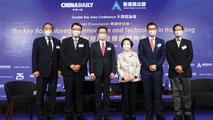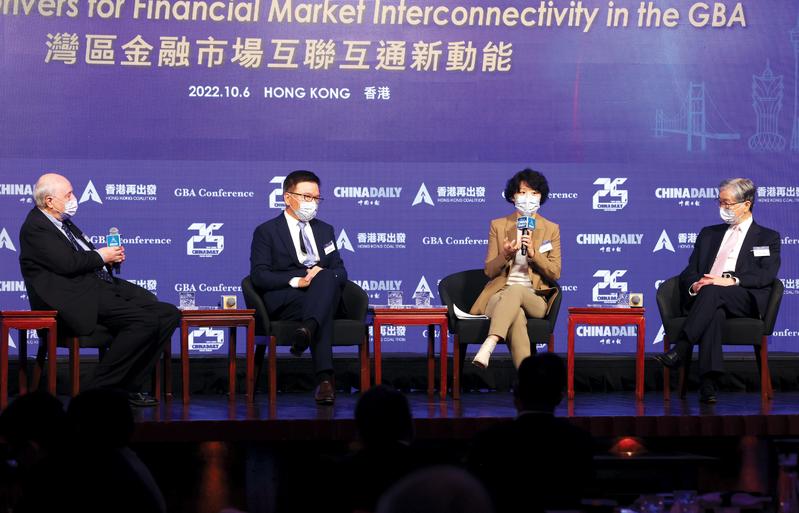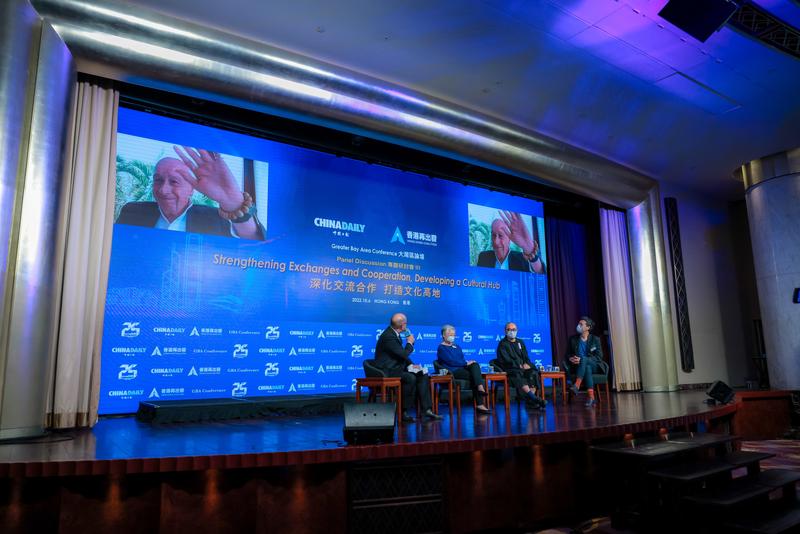Conference keeps focus on area’s connectivity, culture, technology and innovation , scope for expanded links
 (From left) ui Lap-Chee, founding member and president of the Hong Kong Academy of Sciences; guest speaker Sunny Chai, chairman of Hong Kong Science and Technology Park; Zhou Li; Maria Tam Wai-chu; and guest speakers Duncan Chiu, Legislative Council member and Raymond Yip, chief liaison officer of the Guangzhou Nansha Service Centre pose for a photo after the panel discussion entitled “The Key Roles Played by Innovation and Technology in Hong Kong” (PHOTO / CHINA DAILY)
(From left) ui Lap-Chee, founding member and president of the Hong Kong Academy of Sciences; guest speaker Sunny Chai, chairman of Hong Kong Science and Technology Park; Zhou Li; Maria Tam Wai-chu; and guest speakers Duncan Chiu, Legislative Council member and Raymond Yip, chief liaison officer of the Guangzhou Nansha Service Centre pose for a photo after the panel discussion entitled “The Key Roles Played by Innovation and Technology in Hong Kong” (PHOTO / CHINA DAILY)
Hong Kong should accelerate its exploration, research and study of the changing situations in the Guangdong-Hong Kong-Macao Greater Bay Area so that the city can better perform its super-connector role in the building of the region.
Political and business heavyweights made the observations on Oct 6 at the Greater Bay Area Conference 2022 and 25th Anniversary Ceremony of China Daily Hong Kong Edition, themed “GBA: Integration Writes a New Chapter”.
Co-organized by China Daily and the Hong Kong Coalition, the conference comprised three panel discussions — on how to forge financial connectivity, preserve cultural heritage, and promote technology and innovation in the city-cluster area, which comprises the two special administrative regions of Hong Kong and Macao and nine cities in Guangdong province.
Leung Chun-ying, a vice-chairman of the Chinese People’s Political Consultative Conference National Committee, said “knowledge about the changing situations on the other side of the tiny Shenzhen River is key”, as better cross-boundary mobility of resources such as professionals, capital, goods and data is needed.
Leung, a former chief executive of the Hong Kong Special Administrative Region, cited as an example the fact that Chinese customs officials have released new measures regarding Nansha district of Guangzhou, and these measures included the freer flow of materials for biomedical research, the development of an international logistics center, and cross-boundary e-commerce and aircraft leasing businesses.
But the recent development of the Greater Bay Area is not detailed in Hong Kong media reports, or analyses by Hong Kong research institutions, or commentaries by Hong Kong opinion leaders, Leung added.
“What it means is that Hong Kong has to double up efforts of exploring, researching, studying, comparing, ‘tea-sipping’ and engaging on the other side of the river,” Leung said. “As the most international city in the Greater Bay Area, Hong Kong should reinforce the advantage as the super-connector to share our knowledge of the Greater Bay Area cities to entice international business partners.”
 Thoughtful conversation between (from left) the panel chair Anthony Neoh, chair of the Asian Academy of International Law; KC Chan, chairman of WeLab Bank; Cui Li, chief economist, managing director and head of macro research of China Construction Bank International; and Carson Wen, chairman of BOA International Financial Group during the panel discussion styled “New Growth Drivers for Financial Market Interconnectivity in the GBA”. Xiao Geng, director of the Institute of Policy and Practice, Shenzhen Institute of Finance, joins the session online. (ANDY CHONG / CHINA DAILY)
Thoughtful conversation between (from left) the panel chair Anthony Neoh, chair of the Asian Academy of International Law; KC Chan, chairman of WeLab Bank; Cui Li, chief economist, managing director and head of macro research of China Construction Bank International; and Carson Wen, chairman of BOA International Financial Group during the panel discussion styled “New Growth Drivers for Financial Market Interconnectivity in the GBA”. Xiao Geng, director of the Institute of Policy and Practice, Shenzhen Institute of Finance, joins the session online. (ANDY CHONG / CHINA DAILY)
The former Hong Kong leader suggested that media organizations, research institutions, chambers of commerce and professional bodies set up permanent branches in the Greater Bay Area cities to have “eyes and ears, arms and legs and voices on the ground”.
Hong Kong’s incumbent chief executive, John Lee Ka-chiu, said: “Hong Kong will leverage its highly market-oriented and internationalized business environment, its well-developed professional services sectors, as well as the city’s status as an international financial, trade and shipping center” to develop the Greater Bay Area as a world-class city-cluster for living, traveling and working.
“As the world’s freest economy and the largest offshore renminbi business center, Hong Kong is the ideal gateway to connect international investors with the mainland on the one hand and help channel mainland funds to the global market on the other,” Lee said.
Maria Tam Wai-chu, deputy secretary-general of the Hong Kong Coalition, said the integration refers not only to infrastructural integration in transport and communication networks “but also in our rules and regulation, administrative and professional practices and cooperation”.
Tam said that Guangdong province has a complete chain of economic activities, but the services sector is comparatively less strong than the primary and secondary industries.
“Here is where Hong Kong can play a vital role with our strong third-sector services and our links to the world markets,” she said.
In 2021, the total gross domestic product of the Greater Bay Area was about 12.6 trillion yuan ($1.7 trillion), and 25 of its corporations were in the top 500 globally. The city-cluster area has over 50 unicorns (startups with a value of over $1 billion) and over 1,000 incubators.
Qu Yingpu, publisher and editor-in-chief of China Daily, said the conference on Oct 6 invited some of the finest minds in the region to unravel the nuances embedded in the idea of the Greater Bay Area, and to find some well-thought-out responses to some questions.
“Will Hong Kong be able to use its financial services and legal assistance facilities to boost trade ties between fellow Greater Bay Area member cities and their international partners? How effective is its role as a cultural bridge connecting the Greater Bay Area with the rest of the world going to be, and what does Hong Kong stand to gain in the process?” Qu asked.
 (From left) Panel Chair Raymond Tam, Executive Director of Corporate Affairs, Hong Kong Jockey Club; Tisa Ho, Executive Director, Hong Kong Art Festival; Mathias Woo, Co-Artistic Director and Executive Director, Zuni Icosahedron; Alvin Yip, Adjunct Professor, Central Academy of Fine Arts speak at the Panel Discussion III: Strengthening Exchanges and Cooperation, Developing a Cultural Hub during the the Greater Bay Area Conference 2022 co-organized by China Daily and Hong Kong Coalition at Grand Hyatt Hong Kong on Oct 6, 2022. (ANDY CHONG / CHINA DAILY)
(From left) Panel Chair Raymond Tam, Executive Director of Corporate Affairs, Hong Kong Jockey Club; Tisa Ho, Executive Director, Hong Kong Art Festival; Mathias Woo, Co-Artistic Director and Executive Director, Zuni Icosahedron; Alvin Yip, Adjunct Professor, Central Academy of Fine Arts speak at the Panel Discussion III: Strengthening Exchanges and Cooperation, Developing a Cultural Hub during the the Greater Bay Area Conference 2022 co-organized by China Daily and Hong Kong Coalition at Grand Hyatt Hong Kong on Oct 6, 2022. (ANDY CHONG / CHINA DAILY)
In addition to inviting business leaders, think tanks, academics and media professionals, the roundtable also invited local consuls general.
One of them was Almas Seitakynov, the Kazakhstan consul general for Hong Kong and Macao. “The Greater Bay Area is to develop human resources and high technology. I think this is a good opportunity for other countries to develop together,” he told China Daily on the sidelines of the conference.
Through deepened integration, Hong Kong has the potential to play a role in innovation and technology in the Guangdong-Hong Kong-Macao Greater Bay Area, forum attendees heard.
“The Hong Kong government has invested more than HK$150 billion ($19.1 billion) in innovation and technology. This is, to me, a golden age for the I&T of Hong Kong,” said Sunny Chai, chairman of Hong Kong Science and Technology Parks Corp.
Noting that innovation and technology is one of the most important driving engines behind Israel’s economic success, Amir Lati, consul general of Israel in Hong Kong, said it is an area for his country to cooperate with Hong Kong.
Anthony Neoh, chair of the Asian Academy of International Law, said in his keynote address that the Greater Bay Area boasts various growth drivers, such as an expanding population and a leading financial ecosystem.
The area also has two of the largest stock markets in the world by liquidity, namely those of Hong Kong and Shenzhen, Neoh said.
Carson Wen, chairman of BOA International Financial Group, suggested the central government consider moving the border for Hong Kong’s quarantine system to the GBA, so that people in the region could enjoy easy movement.
“Unless people can move around easily, there is no way for Hong Kong and the Greater Bay Area to work closely together,” Wen said.
A panel of heavyweights from the arts sector said Hong Kong is poised to leverage its strengths under the “one country, two systems” principle to build itself into an international hub for arts and cultural exchanges between China and the rest of the world.
In addition to the roundtable conference on how various stakeholders can forge ahead with the Greater Bay Area blueprint, the event on Oct 6 also featured the 25th anniversary of the China Daily Hong Kong Edition.
“In 25 years, China Daily has extended its reach and … enhanced its international following and influence,” Leung said. “It is now a major, comprehensive and reliable source of information on the country’s latest developments.”
Zhou Li, deputy editor-in-chief of China Daily Group and publisher and editor-in-chief of China Daily Asia Pacific, said, “We add an important new voice to the local media and play an ambassadorial role in helping China to forge stronger political and economic ties with other countries and step up social and cultural exchanges.”
“We also helped unpack the idea of ‘one country, two systems’, and articulate its ambitions,” Zhou added.


